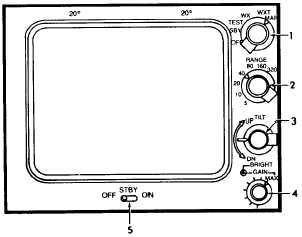TM 1-1510-218-10
3B-57
3B-28. WEATHER RADAR (KWX-58) SYSTEM.
a. Description. The KWX-58 color weather
radar not only displays in-flight weather, but also
permits incorporation of the KGR-358 radar graphics
unit. The color weather radar is used to detect
significant enroute weather formations to preclude
undesirable penetration of heavy weather and its
usually associated turbulence. The weather radar
system provides a 320 nm display, with a 250 nm
weather avoidance range plus weather penetration
advantages. With the radar graphics unit in the NAV
mode, navigation information is integrated with the
weather display. The phased array antenna (flat
plate), located in the nose of the aircraft, is fully
stabilized to compensate for aircraft pitch and roll. The
antenna provides a full 90° scan angle, + 12° tilt, and a
3.75 microsecond pulse width in both weather and
ground mapping modes.
Extended
Sensitivity
Time
Control
(STC)
increases the displayed intensity of storms outside the
normal STC range. Extended STC relates the storm
intensity to its distance and assigns a corresponding
color. As a result, the display presents a more
accurate picture of storm intensity.
Weather systems are displayed as four colors,
depicting rainfall intensity overlaid with range rings.
Bearing marks at dead ahead and 20° on either side
aid the pilot in judging the bearing of storms and
necessary heading changes.
With radar graphics interfaced, activate a circle
mode by pressing the page button located on the radar
graphics control panel. Functional operation in this
mode is the same as in the standard display mode and
is available in both weather and SBY modes. The
range information is displayed in the upper right corner
and represents the outer ring. The inside ring
represents half the displayed distance. The off screen
pointer is replaced by an RMI BUG placed on the outer
ring in the direction of the active waypoint and color
coded to each navigation system. Position of the
aircraft is indicated by the green airplane symbol in the
center of the screen.
Indicator
brightness
is
adjustable
to
accommodate varying ambient light conditions while
automatically maintaining equal brightness between
the four display colors. The system is protected
through
a
5-ampere
circuit
breaker,
placarded
RADAR, located on the overhead circuit breaker
panel, Figure 2-16, Sheet 3.
b. Controls and Functions. Refer to Figure
3B-20.
1. Mode Selector Control Knob
2. RANGE Selector Control Knob
3. TILT Control Knob
4. BRIGHT/GAIN/MAX Control Knob
5. STBY OFF/ON Switch
Figure 3B-20. Weather Radar Control Indicator
(1) Mode Selector Control Knob. The mode
selector knob turns the system on and off and selects
SBY, TEST, WX, WXT, and MAP positions.
(a) OFF. Turns the system off.
(b) SBY. In SBY mode the display is
blanked and transmitter circuits are disabled with the
magnetron heater remaining on.
(c) TEST. When placed in the test mode
all circuitry is activated, except the transmitter. All
weather colors will display for verification in the test
mode as well as the WX, WXT, and MAP modes.
(d) WX. The WX mode is the normal
weather mode with green for light, yellow for
moderate, red for heavy, and magenta for extremely
heavy precipitation.
(e) WXT. The WXT mode is used to
alert the pilot of weather that is beyond the displayed
range. Only returns of significant intensity between 83
and 320 nm are displayed with a white arc at the
approximate azimuth of the storm. A yellow T on a red
background will appear in the upper left corner of the
display, indicating that a storm target has been
located.
(f) MAP. The MAP mode is used for
terrain mapping. Prominent ground features such as
lakes, bays, rivers, cities, coastlines, and offshore
drilling rigs can be clearly discerned and used as a


